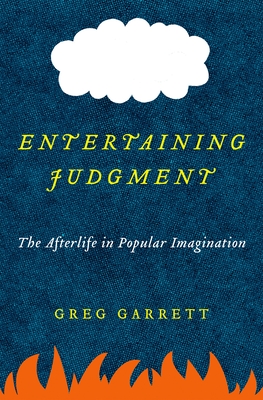By Lily Angelle
The rainy Austin night was the perfect scene to hear Greg Garrett discuss the afterlife with authors Sarah Bird and Owen Egerton on Thursday, January 22nd at BookPeople. With St. Arnold’s beer flowing and the slick, rain-soaked roads outside, folks eagerly holed up on the second floor of our city’s finest independent bookstore to toy with notions of what comes next, what death leads us to.

Garrett kicked off the event by immediately changing into cowboy boots upon his arrival. Then, he read an excerpt from his latest novel, Entertaining Judgement: The Afterlife in Popular Imagination. His thoughtful analysis weaves together information derived from various faith traditions with popular culture, and our simultaneous fear and fixation with interpretations of Heaven, Hell and Purgatory.

Regardless of religion, everyone has some idea of what the afterlife looks like, even if it’s not completely in line with what their religious texts describe. A white light, a rainbow that continues into infinity, or Kinky Friedman’s nice vision of “all the dogs and cats you’ve ever had in your life come running to meet you.” Whatever Heaven looks like in our minds, Garrett explained, says much about who we are, what our ideas of perfection are and what makes us happy now, on earth, in our human bodies. When you die, he described, is when you ultimately have complete understanding of what it means to be human.
He explained how truly interesting it is to analyze death and the afterlife through they eyes of artists, writers and creatives. Lyrics, films and books discuss ideas thoroughly, and why? Egerton’s reasoning behind our nation’s obsession with zombies and vampires via most notably the Twilight series, was that we are mesmerized yet fearful of those who have “been there,” that have been beyond mortal life, having  returned with newfound power and the inability to perish. We’re transfixed by this power and immortality because we as humans are so clearly weak, mortal and decomposing day by day. We are entertained by the idea of life continuing as we know it after death, with more power available to us.
returned with newfound power and the inability to perish. We’re transfixed by this power and immortality because we as humans are so clearly weak, mortal and decomposing day by day. We are entertained by the idea of life continuing as we know it after death, with more power available to us.
Sarah Bird touched on how different cultures cope with death, as her latest novel Above the East China Sea, is set in Okinawa. Why do other cultures have festivals and ceremonies meant to resurrect spirits, the souls of loved ones, while we in America shy away from the paranormal (unless it’s a major found footage franchise), or exhibit sheer horror at the thought of walking with a ghostly loved one?
Bird also tapped into what probably many people have felt having been raised a certain religion – what happens when you grow up believing that you have the answers to everything, and then realize one day that they no longer make sense? Over time, our visions of the afterlife may change, and because it changes, should we assume it’s incorrect, or unlikely to happen? We’re quick to slap a label of “magical realism” onto stories depicting death in creative ways, but who’s to say that it’s not realistic?
Garrett reminded us that there are no right or wrong answers to these questions, which, depending on how you look at death, can make our earthly departure that much more poetic. It’s a wonderful mystery, but Garrett believes that something meaningful, whatever it may be, happens when you die, and not even Colton Burpo can give you a hint as to what that may be.
Check out Greg Garrett’s recent excerpt from Entertaining Judgement, featured by Salon.
